- Home
- William Golding
Pincher Martin Page 8
Pincher Martin Read online
Page 8
“I am afraid to.”
7
The light changed before the staring eyes but so slowly that they did not notice any difference. They looked, rather, at the jumble of unsorted pictures that presented themselves at random. There was still the silent indisputable, creature that sat at the centre of things, but it seemed to have lost the knack of distinguishing between pictures and reality. Occasionally the gate in the lower part of the globe would open against the soft lifebelt and words come out, but each statement was so separated by the glossy and illuminated scenes the creature took part in that it did not know which was relevant to which.
“I said that I should be sick.”
“Drink. Food. Sanity. Rescue.”
“I shall call them the——”
But the glossy images persisted, changed, not as one cloud shape into another but with sudden and complete differences of time and place.
“Sit down, Martin.”
“Sir.”
“We’re considering whether we should recommend you for a commission. Cigarette?”
“Thank you, sir.”
Sudden smile over the clicked lighter.
“Got your nickname on the lower deck yet?”
Smile in return, charming, diffident.
“’Fraid so, sir. Inevitably, I believe.”
“Like Dusty Miller and Nobby Clark.”
“Yes, sir.”
“How’s the life up forrard?”
“It’s—endurable, sir.”
“We want men of education and intelligence; but most of all, men of character. Why did you join the Navy?”
“One felt one ought to—well, help, sir, if you see what I mean?”
Pause.
“I see you’re an actor in civvy street.”
Careful.
“Yes, sir. Not a terribly good one, I’m afraid.”
“Author?”
“Nothing much, yet, sir.”
“What would you have liked to be then?”
“One felt it was—unreal. Not like this. You know, sir! Here in this ship. Here we are getting down to the basic business of life—something worth doing. I wish I’d been a sailor.”
Pause.
“Why would you like a commission, Martin?”
“As an ordinary seaman, sir, one’s the minutest cog in a machine. As an officer one would have more chance of hitting the old Hun for six, sir, actually.”
Pause.
“Did you volunteer, Martin?”
He’s got it all on those papers there if he chooses to look it up.
Frank.
“Actually, no sir.”
He’s blushing, under that standard Dartmouth mask of his.
“That will be all, Martin, thank you.”
“Aye, aye, sir, thank you, sir.”
He’s blushing like a virgin of sixteen.
“She’s the producer’s wife, old man, here where are you going?”
An exceptionally small French dictionary, looking like an exceptionally large red eraser.
A black lacquer cash-box on which the gilt was worn.
The Chinese box was evasive. Sometimes it was the fretted ivories, one inside the other, sometimes it was a single box like a cash-box. But however evasive, it was important and intrustive.
She’s the producer’s wife, old man. Fat. White. Like a maggot with tiny black eyes. I should like to eat you. I should love to play Danny. I should love to eat you. I should love to put you in a play. How can I put you anywhere if I haven’t eaten you? He’s a queer. He’d love to eat you. And I should love to eat you too. You’re not a person, my sweet, you’re an instrument of pleasure.
A Chinese box.
A sword is a phallus. What a huge mountain-shaking joke! A phallus is a sword. Down, dog, down. Down on all fours where you belong.
*
Then he was looking at a half-face and crying out. The half-face belonged to one of the feathered reptiles. The creature was perched on the slab and looking down sideways at him. As he cried out the wide wings beat and flapped away and immediately a glossy picture swept the blue sky and the stone out of sight. This was a bright patch, sometimes like a figure eight lying on its side and sometimes a circle. The circle was filled with blue sea where gulls were wheeling and settling and loving to eat and fight. He felt the swing of the ship under him, sensed the bleak stillness and silence that settled on the bridge as the destroyer slid by the thing floating in the water—a thing, humble and abused and still, among the fighting beaks, an instrument of pleasure.
He struggled out into the sun, stood up and cried flatly in the great air.
“I am awake!”
Dense blue with white flecks and diamond flashes. Foam, flowering abundantly round the three rocks.
He turned away from the night.
“Today is a thinking day.”
He undressed quickly to his trousers and sweater, spread his clothing in the sun and went down to the Red Lion. The tide was so low that mussels were in sight by the ship load.
Mussels were food but one soon tired of them. He wondered for a moment whether he should collect some sweets but his stomach did not entertain the idea. He thought of chocolate instead and the silver paper came into his mind. He sat there, chewing mechanically while his mind’s eye watched silver, flashing bright.
“After all, I may be rescued today.”
He examined the thought and found that the whole idea was neutral as the mussels had become, harsh and negative as the fresh water. He climbed to the water-hole and crawled in. The red deposit lay in a band nearly two inches wide at the nearer edge.
He cried out in the echoing hole.
“It will rain again!”
Proof of identity.
“I must measure this pool. I must ration myself. I must force water to come to me if necessary. I must have water.”
A well. Boring through rock. A dew pond. Line with clay and straw. Precipitation. Education. Intelligence.
He reached out his hand and prodded down with the finger. When his hand had submerged to the knuckles his finger-tip met slime and slid. Then rock. He took a deep breath. There was darker water farther on under the window.
“A fool would waste water by crawling forward, washing this end about just to see how much there is left. But I won’t. I’ll wait and crawl forward as the water shrinks. And before that there will be rain.”
He went quickly to his clothes, took out the silver paper and the string and climbed back to the Dwarf.
He frowned at the Dwarf and began to talk into the blotting-paper.
“East or west is useless. If convoys appear in either of those quarters they would be moving towards the rock anyway. But they may appear to the south, or less likely, to the north. But the sun does not shine from the north. South is the best bet, then.”
He took the Dwarf’s head off and laid the stone carefully on the Look-out. He knelt down and smoothed the silver paper until the sheet gleamed under his hand. He forced the foil to lie smoothly against the head and bound it in place with the string. He put the silver head back on the Dwarf, went to the southern end of the Look-out and stared at the blank face. The sun bounced at him from the paper. He bent his knees until he was looking into the paper at eye-level and still he saw a distorted sun. He shuffled round in such arc as the southern end of the Look-out would allow and still he saw the sun. He took the silver head off the Dwarf again, polished the silver on his seaboot stockings and put it back. The sun winked at him. There stood on the Look-out a veritable man and one who carried a flashing signal on his shoulders.
“I shall be rescued today.”
He fortified and deepened the meaningless statement with three steps of a dance but stopped with a grimace.
“My feet!”
He sat down and leaned against the Dwarf on the south side.
Today is a thinking day.
“I haven’t done so badly.”
He altered the arch over his window with a frown.
“Ideally of course, the stone should be a sphere. Then no matter where the ship appears in an arc of one hundred and eighty degrees the sun will bounce straight at her from the Dwarf. If a ship is under the horizon then the gleam might fetch her crow’s-nest, following it along like a hand of arrest on the shoulder, persisting, nagging, till even the dullest of seamen would notice and the idea sink in.”
The horizon remained empty.
“I must get a sphere. Perhaps I could beat the nearest to it with another stone until it rounds. Stone mason as well. Who was it cut stone cannon-balls? Michael Angelo? But I must look for a very round stone. Never a dull moment. Just like Itma.”
He got up and went down to the sea. He peered over the edge of the little cliff by the mussels but saw nothing worth having. There was green weed and a mass of stone between him and the three rocks but he turned away from it. He went instead to Prospect Cliff, climbed down the ledges to low water. But here there was nothing but masses of weed that stank. His climb tired him and he clung over the water for a moment, searching the surface of the rock with his eyes for anything of value. There was a coralline substance close to his face, thin and pink like icing and then not pink as though it were for ever changing its mind to purple. He stroked the smooth stuff with one finger. They called that paint Barmaid’s Blush and splashed on gallons with the inexpert and casual hand of the wartime sailor. The colour was supposed to merge a ship into the sea and air at the perilous hour of dawn. There were interminable hard acres of the pink round scuttles and on gun shields, whole fields on sides and top hamper, hanging round the hard angles, the utilitarian curves, the grudgingly conceded living quarters of ships on the Northern Patrol, like pink icing or the coral growths on a washed rock. He took his face away from the casing and turned to climb the ladders to the bridge. There must be acres of the stuff spread on the child-time rocks at Tresellyn. That was where Nat had taken her—taken her in two senses, grateful for the tip.
The ship rolled heavily and here was Nat descending the upper ladder like a daddy-longlegs, carefully placing the remote ends of the limbs for security and now faced with a crisis at the sight of the face and the cap. Here is Nat saluting as ever off balance, but this time held in position by one arm and two legs.
“Wotcher, Nat. Happy in your work?”
Dutiful Nat-smile though a little queasy. See the bright side.
“Yes, sir.”
Amble aft you drawn-out bastard.
Climb, climb. The bridge, a little wind and afternoon.
“Hallo. Mean course o-nine-o. Now on zag at one-one-o. And I may say, dead in station, not wandering all over the ocean the way you leave her. She’s all yours and the Old Man is in one of his moods, so watch out for sparks.”
“Zig coming up in ten seconds? I’ve got her.”
“See you again at the witching hour.”
“Port fifteen. Midships. Steady.”
He looked briefly round the convoy and then aft. Nat was there, tediously in his usual place, legs wide apart, face in hands. The corticened deck lurched under him, rearranged itself and he swayed on the rail. The luminous window that looked down at him bent at the sides in a snarl that was disguised as a grin.
Christ, how I hate you. I could eat you. Because you fathomed her mystery, you have a right to handle her transmuted cheap tweed; because you both have made a place where I can’t get; because in your fool innocence you’ve got what I had to get or go mad.
Then he found himself additionally furious with Nathaniel, not because of Mary, not because he had happened on her as he might have tripped over a ring-bolt but because he dared sit so, tilting with the sea, held by a thread, so near the end that would be at once so anguishing and restful like the bursting of a boil.
“Christ!”
Wildebeeste had turned seconds ago.
“Starboard thirty! Half-ahead together!”
Already, from the apex of the destroyer screen, a light was stabbing erratically.
“Midships! Steady. Slow ahead together.”
There was a clatter from the ladder. The Captain burst at him.
“What the bloody hell are you playing at?”
Hurried and smooth.
“I thought there was wreckage on the starboard bow, sir, and couldn’t be sure so I maintained course and speed till we were clear, sir.”
The Captain stopped, one hand on the screen of the bridge and lowered at him.
“What sort of wreckage?”
“Baulks of timber, sir, floating just under the surface.”
“Starboard look-out!”
“Sir?”
“Did you see any wreckage?”
“No, sir.”
“—I may have been mistaken, sir, but I judged it better to make sure, sir.”
The Captain bored in, face to face so that his grip on the rock tightened as he remembered. The Captain’s face was big, pale and lined, the eyes red-rimmed with sleeplessness and gin. It examined for a moment what the window had to exhibit. The two shadowy noses on either side of the window caught a faint, sweet scent. Then the face changed, not dramatically, not registering, not making obvious, but changing like a Nat-face, from within. Under the pallor and moist creases, in the corners of the mouth and eyes, came the slight muscular shift of complicated tensions till the face was rearranged and bore like an open insult, the pattern of contempt and disbelief.
The mouth opened.
“Carry on.”
In a confusion too complete for answer or salute he watched the face turn away and take its understanding and contempt down the ladder.
There was heat and blood.
“Signal, sir, from Captain D. ‘Where are you going to my pretty maid?’”
Signalman with a wooden face. Heat and blood.
“Take it to the Captain.”
“Aye aye, sir.”
He turned back to the binnacle.
“Port fifteen. Midships. Steady.”
Looking under his arm he saw Nathaniel pass the bridge messenger in the waist. Seen thus, he was a bat hanging upside down from the roof of a cave. Nat passed on, walking and lurching till the break of the fo’castle hid him.
He found he was cursing an invisible Nat, cursing him for Mary, for the contempt in old Gin-soak’s face. The centre, looking in this reversed world over the binnacle, found itself beset by a storm of emotions, acid and inky and cruel. There was a desperate amazement that anyone so good as Nat, so unwillingly loved for the face that was always rearranged from within, for the serious attention, for love given without thought, should also be so quiveringly hated as though he were the only enemy. There was amazement that to love and to hate were now one thing and one emotion. Or perhaps they could be separated. Hate was as hate had always been, an acid, the corroding venom of which could be borne only because the hater was strong.
“I am a good hater.”
He looked quickly at the deck watch, across at Wildebeeste and gave orders for the new course.
And love? Love for Nat? That was this sorrow dissolved through the hate so that the new solution was a deadly thing in the chest and the bowels.
He muttered over the binnacle.
“If I were that glass toy that I used to play with I could float in a bottle of acid. Nothing could touch me then.”
Zag.
“That’s what it is. Ever since I met her and she interrupted the pattern coming at random, obeying no law of life, facing me with the insoluble, unbearable problem of her existence the acid’s been chewing at my guts. I can’t even kill her because that would be her final victory over me. Yet as long as she lives the acid will eat. She’s there. In the flesh. In the not even lovely flesh. In the cheap mind. Obsession. Not love. Or if love, insanely compounded of this jealousy of her very being. Odi et amo. Like that thing I tried to write.”
There were lace curtains in decorous curves either side of the oak occasional table with its dusty fern. The round table in the centre of the almost unuse
d parlour smelt of polish—might one day support a coffin in state, but until then, nothing. He looked round at the ornaments and plush, took a breath of the air that was trapped this side of the window, smelt of last year and varnish like the vilest cooking sherry. The room would suit her. She would fit it, she was the room at all points except for the mania.
He looked down at the writing-pad on his knee.
Zig.
“And that wasn’t the half of it. And the acid still eats. Who could ever dream that he would fall in love—or be trapped—by a front parlour on two feet?”
He began to pace backward and forward on the bridge.
“As long as she lives the acid will eat. There’s nothing that can stand that. And killing her would make it worse.”
He stopped. Looked back along the deck at the quarter-deck and the empty, starboard rail.
“Christ! Starboard twenty——”
There was a sense in which she could be—or say that the acid flow could be checked. Not to pass Petty Officer Roberts’ message on was one thing—but that merely acquiesced in the pattern. But say one nudged circumstances—not in the sense that one throttled with the hands or fired a gun—but gently shepherded them the way they might go? Since it would be a suggestion to circumstances only it could not be considered what a strict moralist might call it——
“And who cares anyway?”
This was to run with a rapier at the arras without more than a hope of success.
“He may never sit there again.”
Then the officer of the watch in the execution of his duty gives a helm order to avoid floating wreckage or a drifting mine and no one is any the worse.
“But if he sits there again——”
The corrosive swamped him. A voice cried out in his belly—I do not want him to die! The sorrow and hate bit deep, went on biting. He cried out with his proper voice.
“Does no one understand how I feel?”
The look-outs had turned on their perches. He scowled at them and felt another warmth in his face. His voice came out savagely.
“Get back to your sectors.”

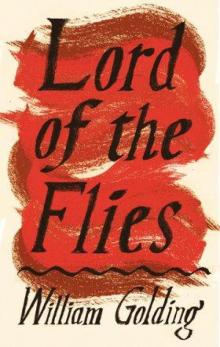 Lord of the Flies
Lord of the Flies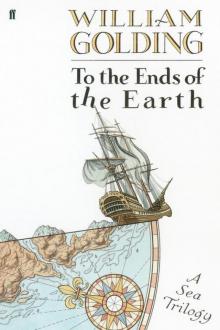 To the Ends of the Earth
To the Ends of the Earth Free Fall
Free Fall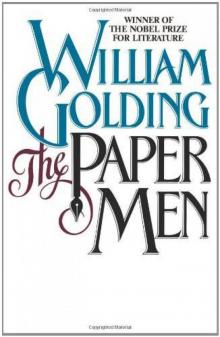 The Paper Men
The Paper Men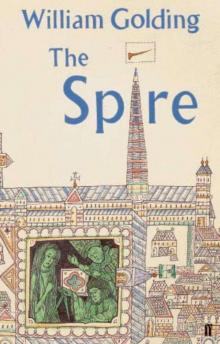 The Spire
The Spire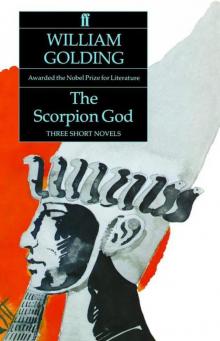 The Scorpion God: Three Short Novels
The Scorpion God: Three Short Novels The Inheritors
The Inheritors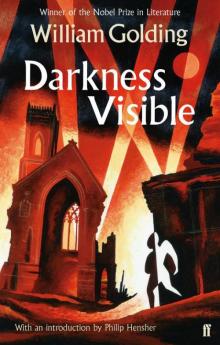 Darkness Visible: With an Introduction by Philip Hensher
Darkness Visible: With an Introduction by Philip Hensher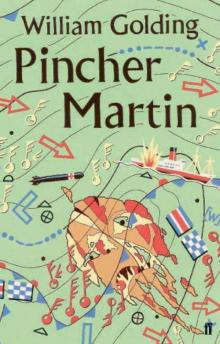 Pincher Martin
Pincher Martin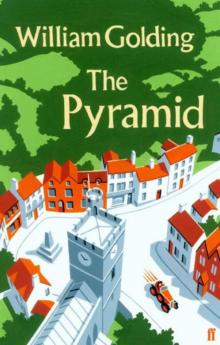 The Pyramid
The Pyramid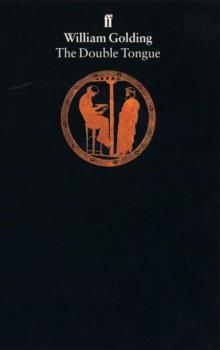 The Double Tongue
The Double Tongue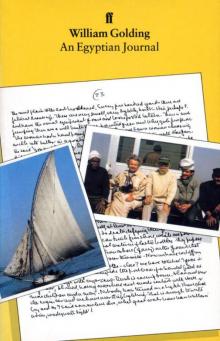 An Egyptian Journal
An Egyptian Journal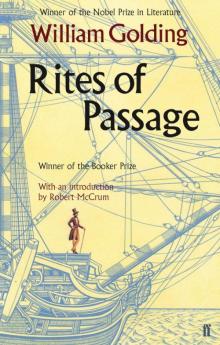 Rites of Passage
Rites of Passage Envoy Extraordinary
Envoy Extraordinary